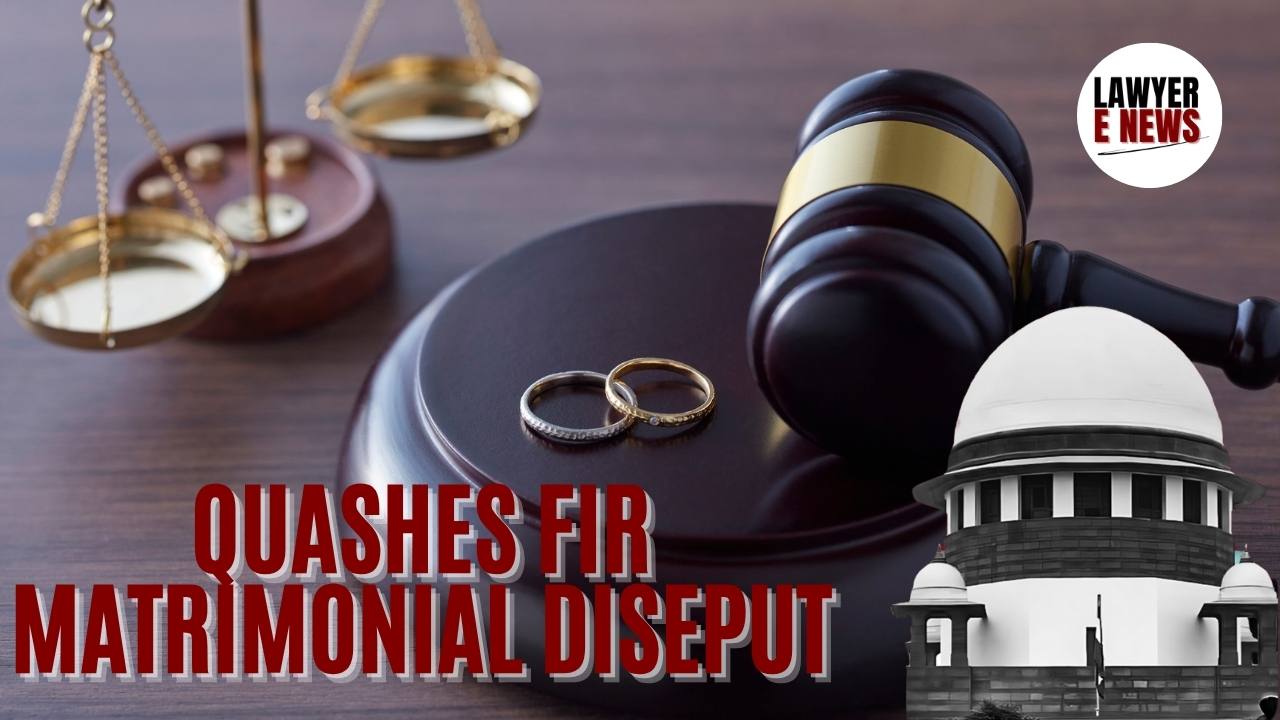-
by Admin
17 February 2026 4:58 AM



“Limitation Is Not a Technical Escape — It Protects Citizens From Perpetual Uncertainty of Prosecution”, In a critical ruling delivered on June 4, 2025, the Supreme Court of India quashed the criminal proceedings against a Delhi Police officer and his entire family in a 23-year-old matrimonial dispute. The Court found that the allegations under Section 498A of the IPC were vague, devoid of evidentiary backing, and reflected a misuse of legal machinery. “A judicial decision cannot be blurred to the actual facts and circumstances of a case,” held the bench comprising Justices B.V. Nagarathna and Satish Chandra Sharma.
The case arose out of an FIR lodged on December 19, 2002, by the complainant wife, herself a police sub-inspector, against her husband Ghanshyam Soni and several members of his family. The marriage was solemnized in 1998 under Buddhist rites. Allegations ranged from persistent dowry demands—including ₹1.5 lakhs in cash, a car, and a separate house—to specific instances of physical assault and threats with a dagger.
The complainant also claimed she was beaten during her pregnancy, threatened on multiple occasions, and ultimately thrown out of her matrimonial home in September 1999. However, she filed the final complaint only on July 3, 2002, leading to an FIR five months later. The Sessions Court initially discharged all the accused, noting the case was time-barred and based on general, unsubstantiated claims. The Delhi High Court later overturned that discharge in 2024, prompting the appeals before the Supreme Court.
The Supreme Court focused on two key questions:
(1) Was the complaint time-barred under Section 468 CrPC?
(2) Did the allegations against the husband and his family warrant a criminal trial under Section 498A IPC?
On Limitation: “The Complaint Was Within Time — Cognizance Can Follow Later”
The Court clarified that the complaint dated July 3, 2002, pertained to events from 1999 and was filed within the statutory three-year limitation period.
“For the purpose of computing the period of limitation, the relevant date must be considered as the date of filing of complaint or initiating criminal proceedings and not the date of taking cognizance by a Magistrate or issuance of process by a court.” — Bharat Damodar Kale v. State of Andhra Pradesh reaffirmed
On Vague Allegations: “Specificity is the Soul of Criminal Trial”
While acknowledging the emotional and societal complexity of matrimonial disputes, the Court insisted that criminal law must be applied with rigor.
“The allegations are generic, and rather ambiguous… there is no specific incident of harassment or any evidence to that effect… the version of the complainant seems implausible and unreliable.”
The Court heavily criticized the blanket accusations made against five sisters-in-law, a tailor, and even the complainant’s aged in-laws, stating:
“Such allegations are merely accusatory and contentious in nature, and do not elaborate a concrete picture of what may have transpired.”
On Abuse of Legal Process: “This Growing Tendency to Misuse Provisions Has Been Condemned Time and Again”
Rebuking the indiscriminate use of criminal law to settle personal scores, the Court referred to prior rulings:
“Notwithstanding the possibility of truth behind the allegations of cruelty, this growing tendency to misuse legal provisions has time and again been condemned by this Court.” — Preeti Gupta v. State of Jharkhand & Dara Lakshmi Narayana v. State of Telangana cited with approval
A Sensitive Complainant Does Not Get a License to Prosecute Without Substance
The Court acknowledged that the High Court had shown a “sensitive approach” by holding that a policewoman can also be a victim of cruelty. However, it emphasized that this empathy cannot override legal standards:
“Judicial decision-making must be strictly based on application of judicial principles to the merits of the case… it cannot be assumed that she could not have been a victim — but mere assumptions cannot replace proof.”FIR and Chargesheet Quashed Under Article 142 of the Constitution
Invoking its extraordinary powers under Article 142, the Supreme Court quashed FIR No. 1098/2002 dated 19.12.2002 and the chargesheet dated 27.04.2002:
“It would be unjust and unfair if the Appellants are forced to go through the tribulations of a trial… this is not a case where the complaint is ex-facie barred by limitation, but it is certainly one where criminal law should not be pressed into service.”
A Measured Judgment Reaffirming Judicial Prudence
This decision is a stern reminder that matrimonial grievances, however genuine they may feel, must meet the evidentiary threshold of criminal law. Vague, omnibus allegations cannot be allowed to weaponize the justice system.
“Relatives of the husband should not be roped in on the basis of omnibus allegations unless specific instances of their involvement in the crime are made out.” — K. Subba Rao v. State of Telangana cited with approval
Date of Decision: June 4, 2025
